|
|
|
Sort Order |
|
|
|
Items / Page
|
|
|
|
|
|
|
| Srl | Item |
| 1 |
ID:
180670
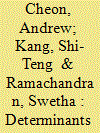

|
|
|
|
|
| Summary/Abstract |
When do indigenous and other negatively affected populations mobilize against fossil fuel companies? We revisit social movement theory and environmental literature to identify three factors that may plausibly shape mobilization decisions of negatively affected populations—democratic institutions, community perceptions of government shaped by land tenure security, and firm attributes. Democratic institutions afford more opportunities for affected populations to air their grievances through protests than non-democratic ones. Land tenure security guaranteed by government contributes to the perception among affected populations that their objectives are better achieved through government mediation than protests. Characteristics of fossil fuel firms, such as state ownership, also shape activist perceptions of government credibility as a mediator. By analyzing fifty-seven countries over the period 1990 to 2013, we find that democracy and state ownership of fossil fuel firms are positively associated with protests, whereas land tenure security is negatively associated.
|
|
|
|
|
|
|
|
|
|
|
|
|
|
|
|
| 2 |
ID:
180671
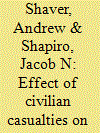

|
|
|
|
|
| Summary/Abstract |
Scholars of civil war and insurgency have long posited that insurgent organizations and their state enemies incur costs for the collateral damage they cause. We provide the first direct quantitative evidence that wartime informing to counterinsurgent forces is affected by civilian victimization. Using newly declassified data on tip flow to Coalition forces in Iraq we find that information flow goes down after government forces inadvertently kill civilians and it goes up when insurgents do so. These results confirm a relationship long posited in the theoretical literature on insurgency but never directly observed, have strong policy implications, and are consistent with a broad range of circumstantial evidence on the topic.
|
|
|
|
|
|
|
|
|
|
|
|
|
|
|
|
| 3 |
ID:
180669
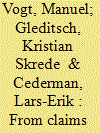

|
|
|
|
|
| Summary/Abstract |
Do radical political demands increase the risk of ethnic civil conflict? And why do ethnic movements make radical demands in the first place? We contend that when movements are fragmented, individual organizations use far-reaching claims relative to the status quo to attract attention from the government, boost intra-organizational discipline, and outbid rivals. Yet, such radical claims also increase the risk of conflict escalation. We test our arguments at both the ethnic group and organizational levels, using a new dataset on ethno-political organizations and their political demands. Our results show that the scope of demands increases the more organizations exist within an ethnic movement and that radical demands increase the risk of civil conflict onset. This effect is specific to the dyadic government-movement interaction, irrespective of other ethnic groups in the country. Moreover, at the organizational level, radicalization in demands increases the likelihood that an organization becomes engaged in civil conflict.
|
|
|
|
|
|
|
|
|
|
|
|
|
|
|
|
| 4 |
ID:
180674
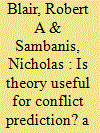

|
|
|
|
|
| Summary/Abstract |
Beger, Morgan, and Ward (BM&W) call into question the results of our article on forecasting civil wars. They claim that our theoretically-informed model of conflict escalation under-performs more mechanical, inductive alternatives. This claim is false. BM&W’s critiques are misguided or inconsequential, and their conclusions hinge on a minor technical question regarding receiver operating characteristic (ROC) curves: should the curves be smoothed, or should empirical curves be used? BM&W assert that empirical curves should be used and all of their conclusions depend on this subjective modeling choice. We extend our original analysis to show that our theoretically-informed model performs as well as or better than more atheoretical alternatives across a range of performance metrics and robustness specifications. As in our original article, we conclude by encouraging conflict forecasters to treat the value added of theory not as an assumption, but rather as a hypothesis to test.
|
|
|
|
|
|
|
|
|
|
|
|
|
|
|
|
| 5 |
ID:
180673
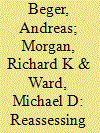

|
|
|
|
|
| Summary/Abstract |
We examine the research protocols in Blair and Sambanis’ recent article on forecasting civil wars, where they argue that their theory-based model can predict civil war onsets better than several atheoretical alternatives or a model with country-structural factors. We find that there are several important mistakes and that their key finding is entirely conditional on the use of parametrically smoothed ROC curves when calculating accuracy, rather than the standard empirical ROC curves that dominate the literature. Fixing these mistakes results in a reversal of their claim that theory-based models of escalation are better at predicting onsets of civil war than other kinds of models. Their model is outperformed by several of the ad hoc, putatively non-theoretical models they devise and examine. More importantly, we argue that rather than trying to contrast the roles of theory and “atheoretical” machine learning in predictive modeling, it would be more productive to focus on ways in which predictive modeling and machine learning could be used to strengthen extant predictive work. Instead, we argue that predictive modeling and machine learning are effective tools for theory testing.
|
|
|
|
|
|
|
|
|
|
|
|
|
|
|
|
| 6 |
ID:
180672


|
|
|
|
|
| Summary/Abstract |
Reputations for resolve are said to be one of the few things worth fighting for, yet they remain inadequately understood. Discussions of reputation focus almost exclusively on first-order belief change—A stands firm, B updates its beliefs about A’s resolve. Such first-order reputational effects are important, but they are not the whole story. Higher-order beliefs—what A believes about B’s beliefs, and so on—matter a great deal as well. When A comes to believe that B is more resolved, this may decrease A’s resolve, and this in turn may increase B’s resolve, and so on. In other words, resolve is interdependent. We offer a framework for estimating higher-order effects, and find evidence of such reasoning in a survey experiment on quasi-elites. Our findings indicate both that states and leaders can develop potent reputations for resolve, and that higher-order beliefs are often responsible for a large proportion of these effects (40 percent to 70 percent in our experimental setting). We conclude by complementing the survey with qualitative evidence and laying the groundwork for future research.
|
|
|
|
|
|
|
|
|
|
|
|
|
|
|
|
| 7 |
ID:
180668


|
|
|
|
|
| Summary/Abstract |
Research on rebel behavior during conflicts has traditionally focused on the use of violent tactics. However, evidence from several intrastate wars suggests that armed groups also occasionally employ general strikes—a method of civil resistance that has typically been associated with nonviolent groups. But when do rebels resort to general strikes? I argue that these tactics have a particular function which can offset potential risks for rebels after they have suffered losses in previous battles: Through general strikes, rebels signal sustained authority to the local population. The argument is tested for districts in Eastern India using newly compiled, disaggregated data on contentious action during the Maoist conflict. The paper contributes to a burgeoning literature on wartime civilian activism in two ways: First, it shows that armed groups themselves rely situationally on civilian mobilization. Second, it investigates the effect of conditions endogenous to the conflict on these tactical choices.
|
|
|
|
|
|
|
|
|
|
|
|
|
|
|
|
|
|
|
|
|